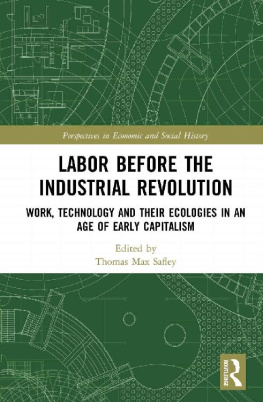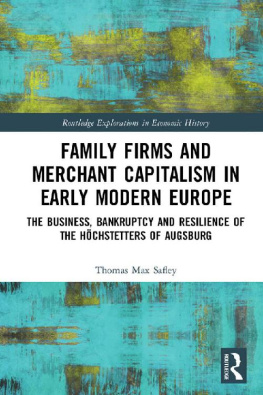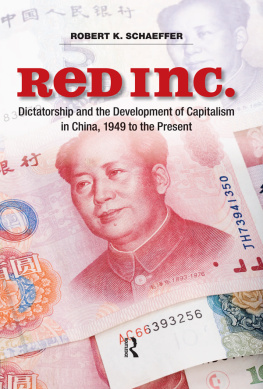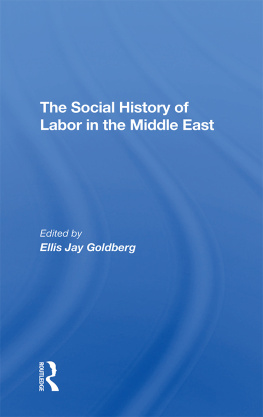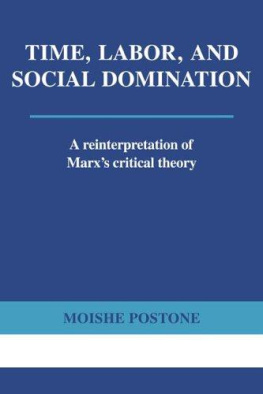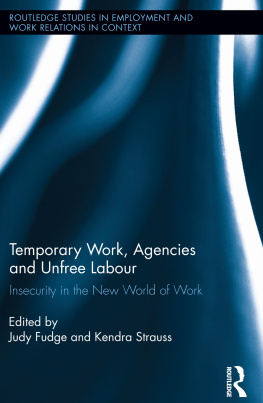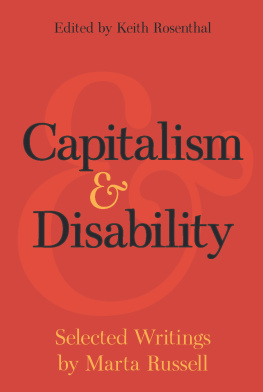
Labor Before the Industrial Revolution
One cannot conceive of capitalism without labor. Yet many of the current debates about economic development leading to industrialization fail to directly engage with labor at all. This collection of essays strives to correct this oversight and to reintroduce labor into the great debates about capitalist development and economic growth before the Industrial Revolution. By attending to the effects of specific regulatory, technological, social and physical environments on producers and production in a set of specific industries, these essays use an ecological approach that demonstrates how productivity, knowledge and regime changed between 1400 and 1800.
This book will be of interest to researchers in history, especially labor history, and European economic development.
Thomas Max Safley is Professor of Early Modern European History at the University of Pennsylvania, USA.
Perspectives in Economic and Social History
Series Editors: Andrew August and Jari Eloranta
48 Property Rights in Land
Issues in Social, Economic and Global History
Edited by Rosa Congost, Jorge Gelman and Rui Santos
49 Working-Class Community in the Age of Affluence
Stefan Ramsden
50 Culture, Philanthropy and the Poor in Late-Victorian LondonGeoffrey A. C. Ginn
51 The Economic and Business History of Occupied Japan
New Perspectives
Edited by Thomas French
52 An Urban History of The Plague
Socio-Economic, Political and Medical Impacts in a Scottish
Community, 15001650
Karen Jillings
53 Mercantilism, Account Keeping and the Periphery-Core RelationshipEdited by Cheryl Susan McWatters
54 Small and Medium Powers in Global History
Trade, Conflicts, and Neutrality from the 18th to the 20th Centuries Edited by Jari Eloranta, Eric Golson, Peter Hedburg, and Maria Cristina Moreira55 Labor Before the Industrial Revolution
Work, Technology and their Ecologies in an Age of Early Capitalism Edited by Thomas Max Safley
For more information about this series, please visit www.routledge.com/
series/PESH

Labor Before the Industrial
Revolution
Work, Technology and their Ecologies in an
Age of Early Capitalism
Edited by Thomas Max Safley
First published 2019
by Routledge
2 Park Square, Milton Park, Abingdon, Oxon OX14 4RN
and by Routledge
711 Third Avenue, New York, NY 10017
Routledge is an imprint of the Taylor & Francis Group, an informa business
2019 selection and editorial matter, Thomas Max Safley; individual chapters, the contributors
The right of Thomas Max Safley to be identified as the author of the editorial material, and of the author for his individual chapters, has been asserted in accordance with sections 77 and 78 of the Copyright, Designs and Patents Act 1988.
All rights reserved. No part of this book may be reprinted or reproduced or utilised in any form or by any electronic, mechanical, or other means, now known or hereafter invented, including photocopying and recording, or in any information storage or retrieval system, without permission in writing from the publishers.
Trademark notice: Product or corporate names may be trademarks or registered trademarks, and are used only for identification and explanation without intent to infringe.
British Library Cataloguing-in-Publication Data
A catalogue record for this book is available from the British Library Library of Congress Cataloging-in-Publication Data
A catalog record has been requested for this book
ISBN: 978-0-8153-6995-0 (hbk)
ISBN: 978-1-351-25108-2 (ebk)
Typeset in Bembo
by Deanta Global Publishing Services, Chennai, India
Contents
THOMAS MAX SAFLEY AND LEONARD N. ROSENBAND
LEONARD N. ROSENBAND
ANDREA CARACAUSI
JELLE VERSIEREN AND BERT DE MUNCK
PHILIPPE MINARD
THIJS LAMBRECHT
vi Contents
SANDRINE VICTOR
ROSER SALICR I LLUCH
CORINE MAITTE
THOMAS MAX SAFLEY
WILLIAM J. ASHWORTH
viii Figures
William J. Ashworth is Reader in History, University of Liverpool (Great Britain). He is the author of Customs and Excise: Trade, Production, andConsumption in England, 16401845 (2003) and The Industrial Revolution:The State, Knowledge and Global Trade (2017), and his current research examines the manufacture of adulterated foods during the Industrial Revolution.
Andrea Caracausi is Associate Professor of Early Modern History at the University of Padua (Italy). He specializes in the social and economic history of Italy and the Mediterranean World, with particular focus on guilds, womens work, child labor and legal proceedings. He received a B.A. in History (University of Padua) and a Ph.D. in Economic and Social History (Bocconi University, Milan). Recent publications include: Information Asymmetries and Craft Guilds in Pre-modern Markets: Evidence from Italian Proto-industry, Economic History Review (2017); A Reassessment of the Role of Guild Courts in Disputes over Apprenticeship Contracts: A Case-Study from Early Modern Italy, Continuity and Change (2017);
Beaten Children and Womens Work in Early Modern Italy, Past &Present (2014).
Bert de Munck is Professor of History in the History Department at the University of Antwerp (Belgium), where he teaches Early Modern History,
Theory of Historical Knowledge and Heritage and Public History. He is a member of the Center for Urban History, Antwerp, and Director of the interdisciplinary Urban Studies Institute and the international research network, Urban Agency: The Historical Fabrication of the City as an Object of Study. His research concentrates on early modern cities, in particular craft guilds, civil society, poor relief and the repertoires of evaluation regarding skills and products. Relevant publication are Guilds, Labour and the UrbanBody Politic: Fabricating Community in the Southern Netherlands, 13001800
(2018), Disassembling the City: A Historical and an Epistemological View on the Agency of Cities, Journal of Urban History (2015), and Artisans, Products and Gifts: Rethinking the History of Material Culture in Early Modern Europe, Past & Present (2014).
Contributors xi
Thijs Lambrecht is Lecturer in Comparative Rural History at Ghent University (Belgium). His research interests include the organization of labor and welfare provisioning in rural societies during the pre-industrial period. His many publications include: Een grote hoeve in een klein dorp. Relaties van arbeid en pachtop het Vlaamse platteland tijdens de 18de eeuw (2002); Agrarian Change, Labour Organization and Welfare Entitlements in the North-Sea Area, c. 16501800
in: S. King and A. Winter (eds.), Migration, Settlement and Belonging in Europe15001930s: Comparative Perspectives (2013); The Institution of Service in Rural Flanders in the Sixteenth Century: A Regional Perspective in: Jane Whittle (ed.), Servants in Rural Europe: 14001900 (2017).
Corine Maitte is Professor of Early Modern History at the University of Paris-Est Marne-la-Vall e (France) and a member of the working group, Analyse Compar e des Pouvoirs EA 3350. She is a specialist on the economic and social history of modern Italy; the history of migration; the history of skills and corporations, especially among glass manufacturers in Italy, France and the Low Countries; wool manufacturing in Tuscany and Piedmont; and the history of working times. Her recent publications include
Next page
